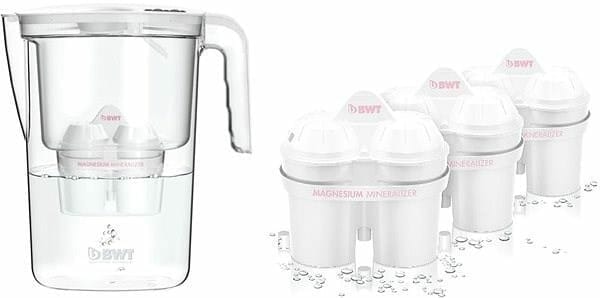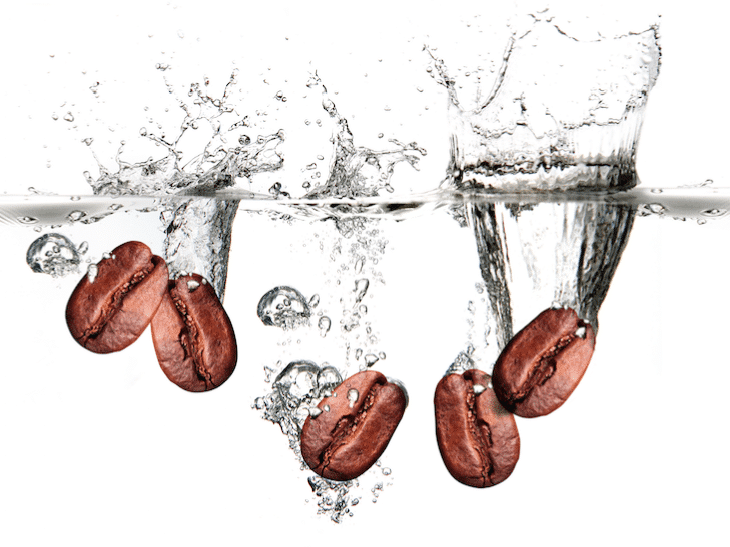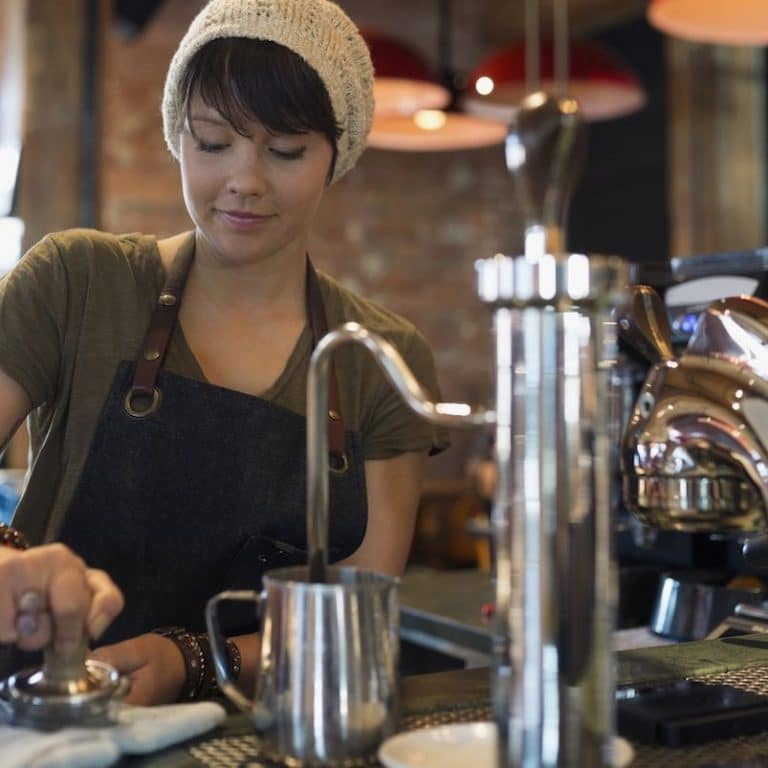In this article, I will go over an essential aspect of your coffee game. From the title, you know that it’s water.
If you are interested in improving your coffee then you really need to read this helpful article.
Why is Water Important for Your Coffee?
Little is known about the nature of water for professional and home baristas to achieve the best possible result in a cup.
If you read about the way of preparing coffee and coffee specialties, you will learn a lot about types of coffee and their origin, roasting and grinding as well as about the preparation, the machines and their features, their operating parameters, etc.
One ingredient that is over 98% in a filter coffee and around 90% in an espresso receives far less attention is water. It is the universal extractant for coffee. It is an important factor if not the most significant,
By the time it arrives at home, water has had a long journey behind it. From the clouds from which it rains, it finds its way through the earth and rocks. And it finally ends up in our coffee machines and coffee cups after being treated at the local waterworks.
And along the way, water, which is an outstanding solvent, absorbs a lot.
Therefore, a multitude of substances can be found in our drinking water.
These include natural substances such as calcium or magnesium and carbonates, sodium, potassium, iron and chloride, and anthropogenic that get into the water as a result of interventions in the environment, such as excessive iron and chloride, or sulfide and sulfate.
There are also particulate substances such as sand or rust from the pipe network and organic components or chlorine or hypochlorite in drinking water.
Water has the property of being acidic, neutral, or alkaline. We can measure and record this on the pH value scale.
How is Water Important
Limescale protection and filtering the water are only one side of the coin.
Baristas, however, are primarily interested in taste and the sensory experience when serving their creations.

Cem Korkmaz, Austrian master barista 2011 developed a cupping water experiment for BWT water (Best Water Technology) and carried out several tastings at the Berlin championships.
He used the same coffee with identical parameters such as grinding, temperature, and extraction time for brewing coffee for cupping manufactured and only changed the water quality.
Different types of raw water from Berlin (medium hardness, high sulfate content), Wiesbaden (medium hardness), and Würzburg (tough water) were used.
Any foreign smell and taste were removed from the water with a BWT best taste filter, but without changing the water hardness.
A total of around 100 testers, from professionals to hobby baristas, took part in this cupping tasting.
Practically all testers were able to determine the striking differences in taste and aromas, depending on the water.
The coffee testers found the coffee to be most harmonious when made with Berlin raw water that had previously been optimized with water filters.
This filter removes calcium, the limescale builder, exactly the right amount, and with a suitable pH value to develop unhindered flavors and aroma.
Also, the unwanted calcium sulfate (gypsum) is specifically removed from the water.
In general, the coffee quality was significantly better after a targeted optimization of the respective raw water.
There were deviations in all untreated raw water. The coffees made with it tasted off because they were either too stale or the bitter substances unpleasantly came to the forefront.
But what was even more astonishing was that all coffees tasted and smelled differently depending on the type of water, even though they were made with the same coffee.
Explaining the Results
A possible explanation for this phenomenon: if there are many components in the water, i.e. is it very hard or the pH value is acidic, the bitter substances dominate, which are extracted disproportionately in this milieu.
Besides, there is a blockage of flavor and aroma substances in coffee because they “bind” calcium and therefore no longer trigger the desired sensory stimulus on the tongue or nose.
If you have too few minerals in the water, the flavor carriers are missing, and it tastes bland.
If the water’s pH value is not optimal, the acidic notes from the coffee can come into their own. They cover up some of the finer taste notes and prevent the development of volatile aromas.
Once you have “tasted” these findings like the coffee testers at the Barista Championships in Berlin, every professional and home barista will only become clearly aware of the importance of water for their own creations.
It, therefore, depends on the right water optimization, which on the one hand reduces the lime content to protect the coffee machines, but on the other hand, also leaves enough minerals in the water for a perfect coffee.
So water filters bring the water into the necessary balance.
The Six Keynotes
These six major questions you should be asking while making coffee are:
Mixture
Which coffee mix are you using in your coffee?
Quantity
Is the ratio of water to coffee right?
Machine
Which machine is being used?
Medium
Which kind of water is being used?
Person
How well does the barista know about the subject?
Grinding Degree
How fine or coarse is the coffee ground?
Features of Water
Coffee would not be possible without water.
But what role does water play in the development of taste? We got to the bottom of the water for you once more.
Find out why good coffee deserves the best water and how you can optimally prepare your water.
As proven, water has an enormous influence on the aroma and taste. It is not just the easily measurable factors such as hardness and pH value; there are also the numerous chemical substances (minerals) in water in different concentrations, chlorination, the material of the respective water pipes, or the duration of the water usage in the lines, which can have an impact on taste and aroma.
With the same measurable water values and identical preparation, the same coffee can taste significantly different. And when using water that is sometimes very soft and sometimes very hard, coffee can only be identified as the same by experienced tasters.
Temperature of Water
Good coffee water should always be fresh and rich in oxygen. It, therefore, makes sense only to use cold, not stale water for the coffee.
This water should be heated as quickly as possible so that as little oxygen as possible is lost during heating.
Therefore, please do not take warm water out of the tap and then boil it.
Suppose no water has been removed from the line for a long time, e.g. during a vacation, it is not advisable to use the first water drained out to prepare coffee.
Even water that is in a fully automatic machine for several days is unsuitable for full taste development.
It does not help much empty the water tank, because depending on the machine type, some of the water always remains in the boiler.
Hard Water
The most well-known and perhaps the most important factor influencing the taste of coffee is water hardness.
But how does “water hardness” come about and what does it mean?
Rainwater flows from the surface through the soil and collects as groundwater.
It depends on the nature of the soil to what extent substances are coming from the soil.
The higher the proportion of calcium and magnesium that the water absorbs on its way through the soil, the harder it is. Strictly speaking, water hardness is a measure of the number of minerals in the water as ions, especially the vital minerals like calcium and magnesium.
Good coffee water can be rich in minerals, as the minerals and salts contained in the water are also flavor carriers.
The softer the water, the fewer limescale deposits there are on household appliances, and the less detergent and washing powder is required.
Soft water is mainly in regions with granite, gneiss, basalt, and slate.
On the other hand, hard water causes the equipment to become calcified and requires a higher consumption of detergents and detergents.
Limescale deposits in the water pipes, however, protect the metal from corrosion.
Hard water is prevalent in regions with sandstone and limestone; hard water can neutralize the fine acids in coffee and give it a flat taste.
This effect is stronger; the longer the contact time between water and coffee grounds lasts.
The result is then – despite the long contact time – a little aromatic and flat coffee.
Dealing with Hard Water
A tip for hard water: after boiling, let the water stand for a few minutes and, depending on the degree of hardness, boil it up once or twice again.
Despite the loss of oxygen caused by this, the coffee gains a distinct taste due to the precipitating lime. Or add a tiny pinch of baking soda to each cup.
But make sure that it doesn’t become soft.
Coffee water that is too soft can also hurt the taste of the coffee. This can lead to a change in the swelling behavior of the ground coffee. Over-extraction with high acidity and bitter intensity in the coffee and low taste acceptance can be the consequences.
pH Value
The pH value is also significant for assessing the water.
The range of possible pH values ranges from pH 0 (extremely acidic, e.g. hydrochloric acid) to pH 14 (fundamental, e.g. sodium hydroxide solution).
In the middle of the pH scale is the so-called neutral point with a pH value of 7.
Ideally, drinking water’s pH value should be close to pH 7, but slight deviations are common and are completely harmless.
The Drinking Water Ordinance stipulates that drinking water must have a pH value between 6.5 and 9.5.
The ideal value for coffee preparation is 7 – 7.2.
For comparison: Coca-Cola has a pH value of around 2.3, lemon juice around 2.5; so both are very acidic. If the water is acidic (pH <7), the contact time does not play such an important role. Overall, coffee acids are stronger and more intense.
Coffee shows “what’s in it” much more clearly than hard water with a high carbonate hardness and high (= alkaline) pH value.
You can find out which water supply company is responsible for you on your water bill.
However, please state your exact place of residence, because many water suppliers obtain water from different origins. The water of a supply area unless it is mixed can be different depending on residence or city district.
Water Filters
Many lovers of espresso, cappuccino & others, do not know that the use of water filters can significantly improve the taste of the coffee.
Because filtered tap water is softer, it ensures better aroma development and more taste when preparing coffee.
Also pure or chilled – as an extra with coffee – filtered water tastes great.
Another advantage is that filtered water effectively protects espresso machines and fully automatic coffee machines from calcification. This has a positive effect on the devices as they provide a longer service life and lower energy consumption.
How to Protect Your Machines
All of these substances in the water, such as lime formation have an effect on your coffee machine. This means that we not only have to protect our machine technology from the formation of limescale but that we should also keep an eye on the sensors.
Anyone who seriously produces coffee specialties, whether at home or work, knows that they have to protect their expensive technology with water filters. It can be protection against limescale that forms primarily on the hot surfaces of boilers, heat exchangers, and heating elements.
Special ion exchangers in water filters primarily remove calcium from the raw water and prevent lime from building up in the form of calcium carbonate and sticking to machine parts.
Because that hinders the heat transfer and causes malfunctions in valves or pumps, which leads to costly repairs.
Other unwanted components can be removed with fine filters and organic compounds and chlorine with activated carbon.
Water filter manufacturers have taken on this topic and developed special multifunctional filters. So, the machines can be perfectly protected from normal lime and other foreign substances.
However, the permanent hardness is much more unpleasant when there is sulfate in the water. It precipitates in the form of gypsum in connection with calcium and attacks the coffee machine.
In contrast to normal lime, it stubbornly defies the cleaning processes routinely carried out in many coffee machines.
Finishing Thoughts
Controlling the minerals in the water is important for both taste and aroma.
You can always find some great BWT filters on Amazon.
I really think it’s of huge importance, to use good water, as it’s the effect on your coffee is immense. By the end of the article, you must agree with me.
After I started using a water filter, for my love of coffee, but funny enough also for drinking water.







